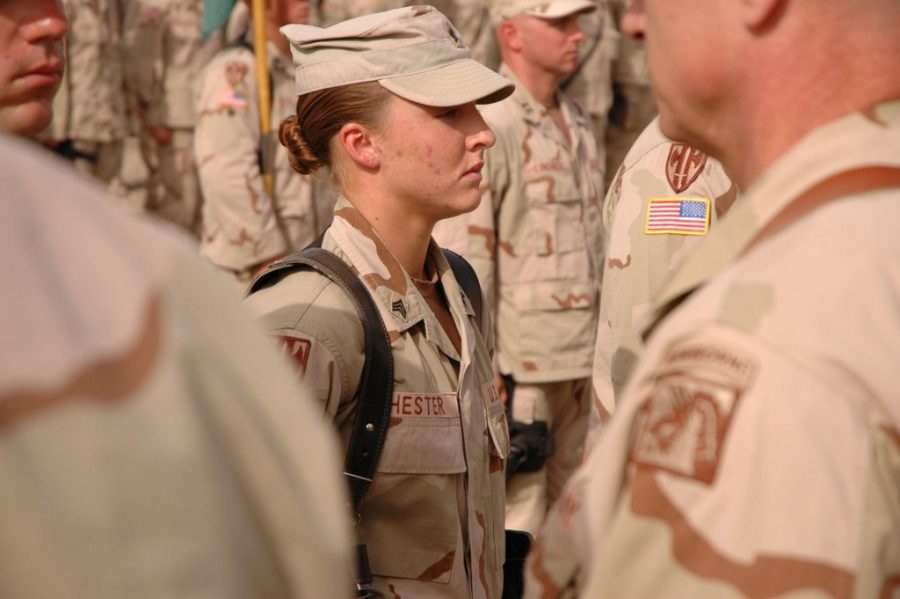Should We Draft America’s Daughters?
Bill would require women to register for the draft
(Public Domain via Wikipedia Commons)
Sergeant Leigh Ann Hester, a United States Army soldier, waits to be awarded the Silver Star medal during a military awards ceremony at Camp Liberty, Iraq, on June 16, 2005. U.S. Army photograph by Jeremy D. Crisp.
The draft has been a controversial issue throughout American history. Presently, men between the ages of 18 and 26 must register so that, if and when, Congress and the president deem it necessary, they may be drafted into mandatory military service. A fairly recent bill was introduced in 2016 that would amend the Military Selective Service Act to include young women as well.
We have had an all-volunteer armed service force since 1973, but the U.S has relied on the draft many times throughout its history, including the Revolutionary War, Civil War, both World Wars, the Korean War, and the Vietnam War. It’s been useful, but it has had its share of opponents. In 1918, in the case of Arver v. United States, the Supreme Court had to uphold the right of the government to force “conscription” (which is the old-fashioned and more official name for the draft) when it was challenged.
In the Vietnam era of the 1960s and 1970s, when many disagreed with the war, there was a lot of turmoil and unrest regarding the draft. A lot of people protested, some burned their draft cards and others fled to Canada or found other ways to avoid joining the military.
Now, we face a different type of question, should America’s women have to sign up too? In 2016 Duncan D. Hunter (R) California introduced H.R. 4478, also known as the Draft Americas Daughters (DAD) bill or DADA for Draft America’s Daughter’s Act. It calls for the women to register for the draft just like young men do. Ryan K. Zinke (R) Montana co-sponsored the bill.
What do you think?
In March of 2016, the DAD bill was referred to the sub-committee on Military Personnel. Supporters think that it helps advance the basic principles of gender equality and reflects the advancement of women’s role and capabilities in today’s U.S. military. Currently, all men in the U.S. must register for the draft within 30 days of their 18th birthday. Forcing women to do the same thing does not have universal support, and has caused debate.
Former President Obama supported the bill, calling it a move towards gender equality. And, former Secretary of State and Democratic presidential candidate Hillary Clinton told the Huffington Post that she supported it. President Trump has been less clear on his stance, however he did tell the Washington Post that he wanted to move away from politically correct motivations.
Interestingly, support for DAD does not seem to be divided strictly per party lines or liberal or conservative viewpoints. A liberal who is “pro-equality” might support the act, while another might not. Or, a Republican might support the act while another might disagree. The same is true for Democrats.
To examine the issue on a more local level, we polled 100 students and 30 faculty members at Abington High. In a face to face setting, our reporter asked, “Do you think our government should have the right to draft women for military service?” The results are below.
| # Yes | # No | % Yes | % No | |
| Male Students | 38 | 12 | 76 | 24 |
| Female Students | 33 | 17 | 66 | 34 |
| Totals | 71 | 29 | 71 | 29 |
| Male Faculty | 5 | 2 | 71 | 29 |
| Female Faculty | 17 | 6 | 74 | 26 |
| Totals | 22 | 8 | 73 | 27 |
| Combined Total | 93 | 37 | 72 | 28 |
Given these results, AHS is mostly in favor of the DAD bill. This is not necessarily surprising or unsurprising because it is hard to have a preconceived notion about this issue. But, in some ways, it does make sense because of the strong democratic support of the bill, Massachusetts’ reputation as a democratic stronghold, and lackluster republican support or even opposition.
When asked why they responded the way they did, many mentioned gender equality as justification, but some females claimed they personally did not wish to be drafted, and as such would not support this congressional action.
At this point, the act continues to be debated, and only time will tell if it becomes a reality. Most recent news reports seem to indicate that lawmakers are no longer hot on this issue, and will likely order further study before it is debated further (according to Military.com.)

Giovan is a member of the Class of 2019. He joined the Green Wave Gazette during his freshman year and became a copy editor during his sophomore year....



Susan Crowley • Feb 8, 2017 at 4:28 PM
Nice job !